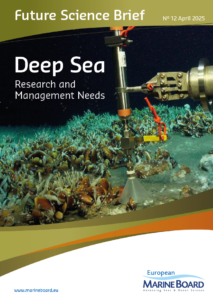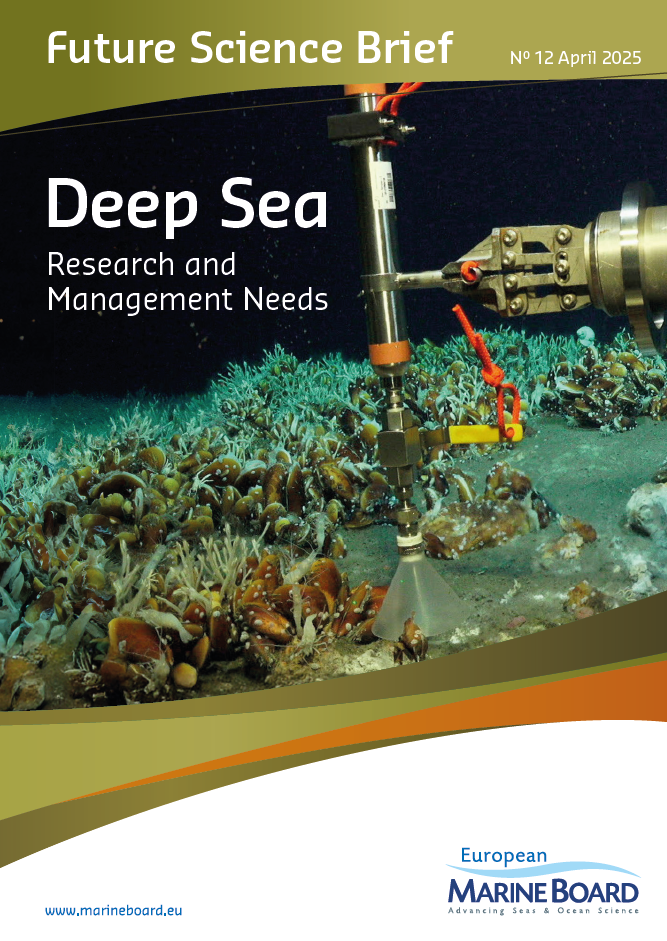A new European Marine Board Future Science Brief led by Professor Dr Sylvia Sander of GEOMAR Helmholtz Centre for Ocean Research Kiel warns that without better understanding of deep-sea ecosystems, sustainable management is impossible. The report, launched on 11 April 2025 via an online webinar, stresses the urgent need for targeted research and policy action to protect these critical but largely unexplored environments.
 The deep sea, defined in this report as waters and seabed below 200 metres, makes up around 90% of the ocean’s volume. It plays a crucial role in biodiversity, climate regulation, and the global carbon cycle. Yet, this vast realm is increasingly threatened by oil extraction, fishing, mining, and climate change.
The deep sea, defined in this report as waters and seabed below 200 metres, makes up around 90% of the ocean’s volume. It plays a crucial role in biodiversity, climate regulation, and the global carbon cycle. Yet, this vast realm is increasingly threatened by oil extraction, fishing, mining, and climate change.
The European Marine Board’s Deep Sea and Ocean Health Working Group, comprising eleven researchers, presents ten key recommendations for sustainable governance and conservation. These include establishing an international scientific committee, improving environmental impact assessments, investing in long-term monitoring, enhancing education and technology transfer, and applying FAIR (Findable, Accessible, Interoperable, Reusable) data principles.
“The ocean is a connected system,” says Prof. Sander. “The deep sea cannot be managed separately from the rest of the marine environment.”
Historically considered inhospitable, the deep sea is now known to host complex ecosystems, including hydrothermal vents and abyssal plains. However, much remains unexplored. It’s estimated that 90% of deep-sea organisms are still undescribed, and key scientific gaps persist across physical oceanography, marine geochemistry, and ecosystem functioning.
Challenges in technology also hinder data collection. Current monitoring systems are often not suited for extreme depths, limiting our ability to track the impacts of activities like deep-sea mining. Understanding these systems is critical to ensure decisions are science-based and support long-term sustainability.
Human activities are already disrupting the deep sea, with warming, acidification, and oxygen loss accelerating due to climate change. Overexploitation of marine resources adds further stress. As the ocean regulates CO₂, produces over half of Earth’s oxygen, and supports life, its degradation poses global risks.
The authors see 2025 as a pivotal moment for ocean health. Achieving net-zero emissions by 2050 and curbing biodiversity loss now are essential to avoid irreversible impacts. “Climate change is one of the most alarming threats to life on Earth,” says Sander. “Combined with biodiversity loss, it could disrupt ocean systems permanently.”
Europe, the report suggests, has a unique opportunity to lead. Through strong international engagement and funding of transdisciplinary research, the EU can champion global deep-sea protection. This includes supporting underrepresented nations in research and recognising science as a human right.
Only through global collaboration and increased scientific investment can the deep sea, and the broader ocean, be preserved for future generations.
Download the publication here.
The Institute of Natural Sciences also focuses on research into the ecological structure and functioning of the deep sea. The assessment of the potential impact of human activities and the formulation of related policy advice are also given attention.
The Belgian Federal State is represented in the European Marine Board (EMB) by the Belgian Science Policy Office (BELSPO) and in the EMB Communication Panel by the Institute of Natural Sciences.

